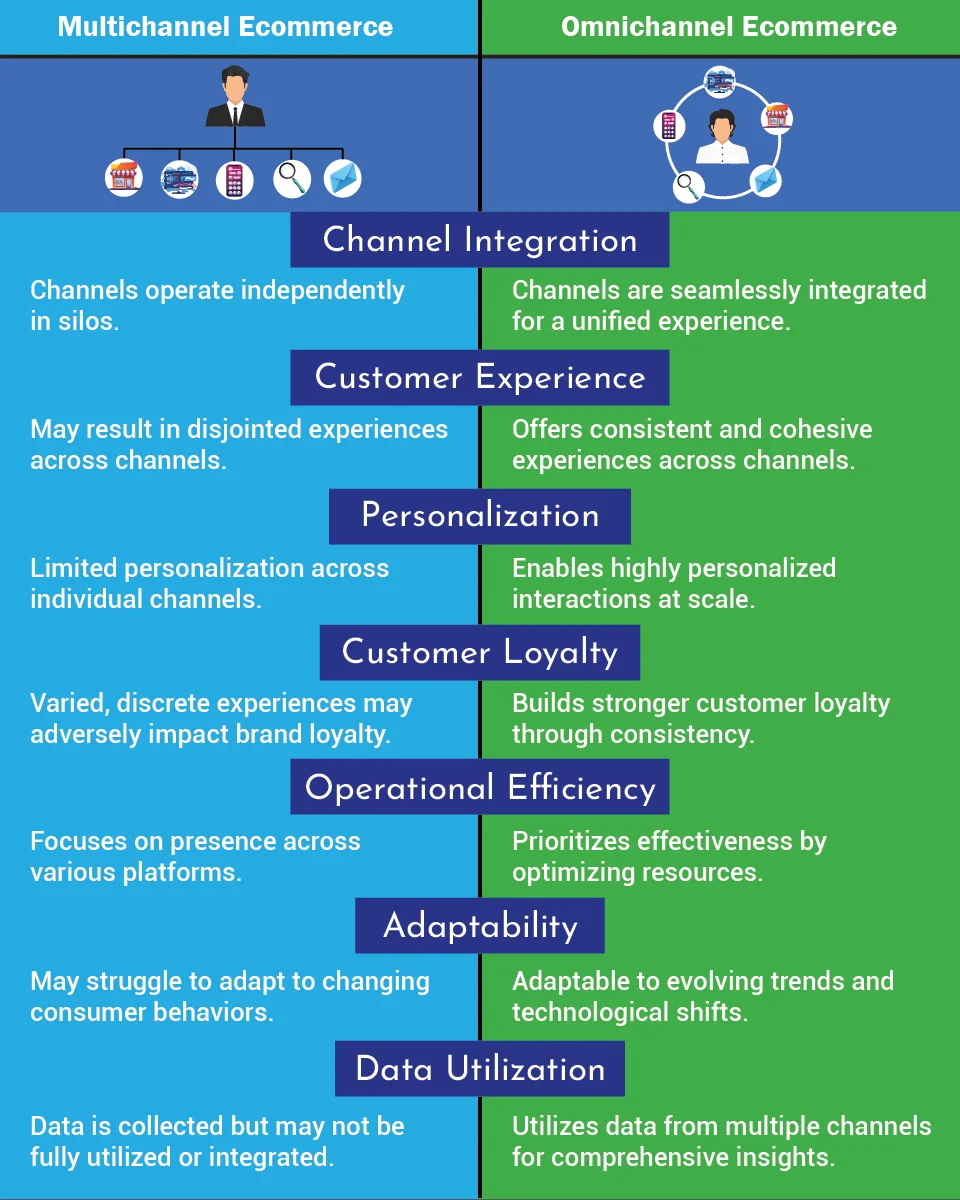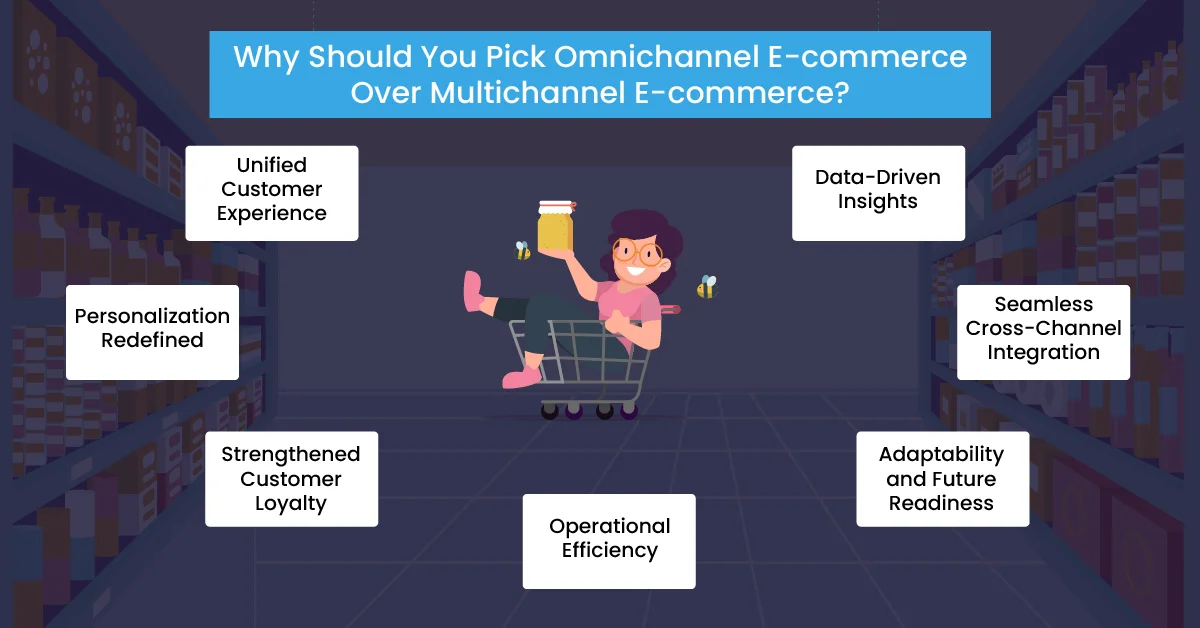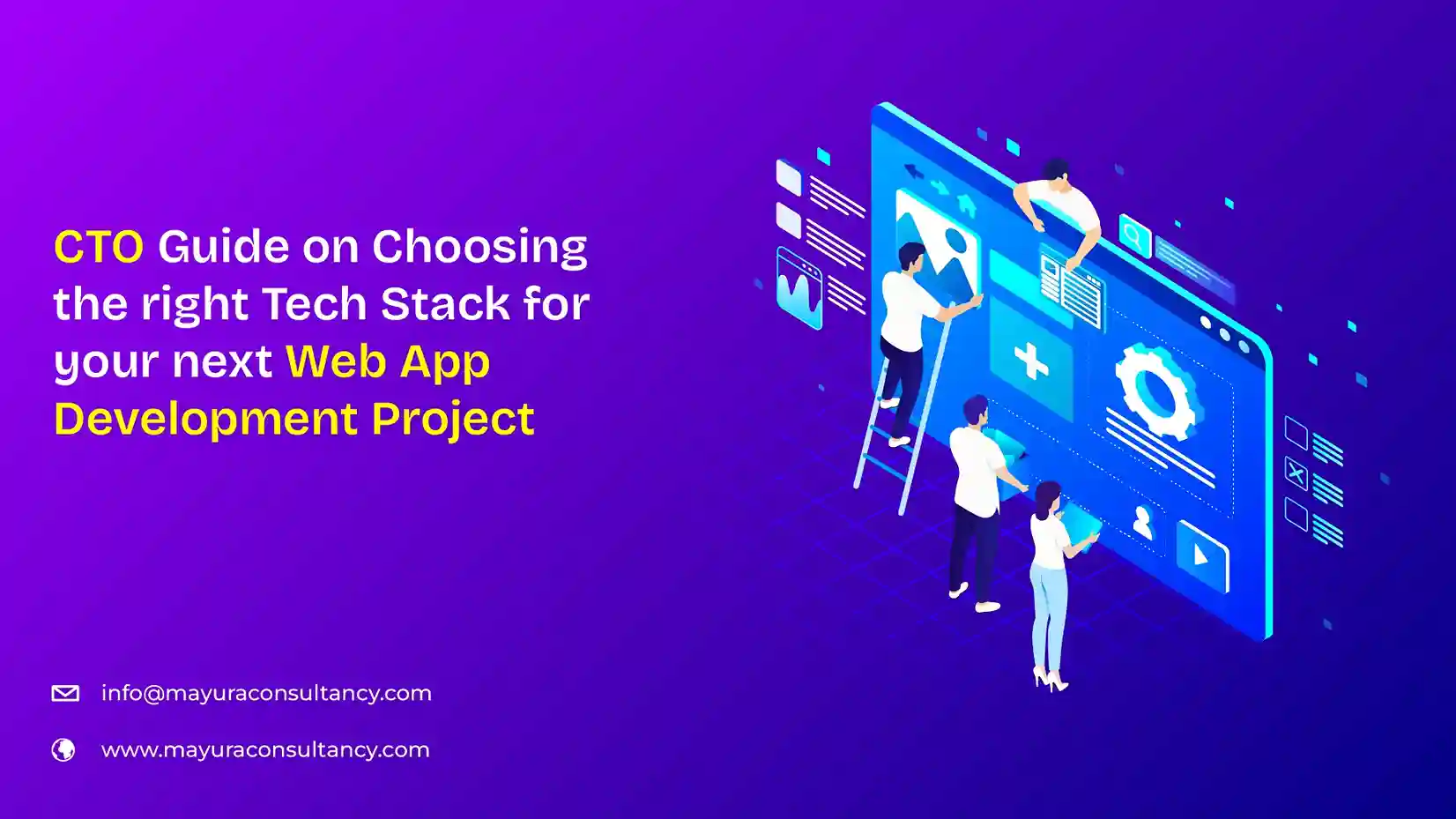While there may be some overlap between the two, multichannel and omnichannel e-commerce marketing fundamentally differ from each other. Multichannel marketing uses different tools to talk to customers, such as websites and social media. On the other hand, omnichannel marketing is about making all these tools work together, so customers can move in and out of your funnel easily but can continue where they left off every time they return. The main difference is that omnichannel aims for a smooth and consistent experience across all ways a brand interacts with customers, while multichannel merely refers to the presence of a brand on multiple different channels.
The main difference is that omnichannel aims for a smooth and consistent experience across all ways a brand interacts with customers, while multichannel merely refers to the presence of a brand on multiple different channels.
This Article Contains:
What is Omnichannel E-commerce?
Omnichannel integrates various sales channels into a unified and seamless shopping experience. This approach ensures consistency across online and offline platforms. For instance, a customer can start browsing products on a mobile app, add items to the cart, and later complete the order on a desktop computer. The experience is consistent and interconnected.
What is Multichannel E-commerce?
On the other hand, multichannel e-commerce involves using multiple independent channels for selling products or services. While this e-commerce channel strategy allows businesses to reach customers through various platforms, these channels often operate in isolation. So, they lack the integration and cohesive features of omnichannel systems.
Know the Difference: Multichannel E-commerce vs Omnichannel E-commerce

Why Should You Pick Omnichannel E-commerce Over Multichannel E-commerce?
Now that we have established the difference between omnichannel and multichannel ecommerce, you might have already realized how the former trumps the latter across multiple parameters.

If you haven’t, here is why you should pick omnichannel over multichannel e-commerce:
Unified Customer Experience: The hallmark of omnichannel marketing lies in its commitment to offering a consistent and unified journey regardless of the chosen channel. By ensuring coherence in messaging, branding, and service, it forges a seamless narrative that resonates deeply with consumers.
Personalization Redefined: Leveraging sophisticated data analytics and insights, omnichannel strategies empower businesses to understand and anticipate customer preferences with precision. This enables tailored and hyper-personalized interactions, delivering recommendations, offers, and content uniquely suited to individual preferences across diverse touchpoints.
Strengthened Customer Loyalty: The seamlessness of omnichannel experiences fosters stronger emotional connections between brands and consumers. The convenience and reliability provided by consistent experiences lead to enhanced customer satisfaction and loyalty among customers.
Operational Efficiency: While multichannel strategies emphasize broad presence, omnichannel approaches prioritize effectiveness. With cross-channel retailing, businesses can seamlessly integrate various sales channels, improving operational efficiency and providing customers with a unified shopping experience across online and offline platforms.
Adaptability and Future Readiness: In an era of rapid technological advancements and evolving consumer expectations, the agility of omnichannel marketing stands as a competitive advantage. It flexibly adapts to emerging technologies and changing consumer behaviors, ensuring brands remain relevant and responsive to future trends.
Seamless Cross-Channel Integration: Omnichannel strategies facilitate cross-channel retailing, enabling customers to switch effortlessly between online browsing, mobile interactions, in-store experiences, and more, without experiencing disruptions or inconsistencies.
Data-Driven Insights: By aggregating data from multiple sources, omnichannel marketing provides comprehensive insights into customer behavior, preferences, and buying patterns, enabling businesses to make informed decisions and optimize their strategies.
What Does an Omnichannel E-commerce Experience Look Like?
Imagine your customer, Sarah, engaging with your brand's offerings through various channels, all seamlessly interconnected. Sarah's journey begins as she leisurely browses through your mobile app, exploring an array of products tailored to her preferences. The app's intuitive interface captivates her attention, allowing her to effortlessly add items to her cart. But she’s not sure about the purchase, so she decides not to check out just yet.
Now here's where the symphony of omnichannel orchestration kicks in: Sarah receives a personalized email shortly after her app exploration ends. This isn’t just any run-of-the-mill email; it’s an expertly crafted message showcasing recommendations perfectly aligned with her browsing history and preferences. Intrigued by these suggestions, Sarah clicks through the email, landing back on your brand's website.
On the website, Sarah finds herself immersed in a world of detailed product information, user reviews, and additional recommendations that resonate with her tastes. The seamless transition from the mobile app to the website offers continuity and depth to her browsing journey, enriching her experience and strengthening her connection with your brand.
Now, Sarah's journey continues beyond the digital realm—she decides to visit the physical store to see the products first-hand. As she steps into the store, her journey continues where she had left off. The staff, armed with insights from Sarah's previous interactions, warmly welcomes her, ready to assist with personalized recommendations and a smooth, hassle-free checkout process.
This harmonious integration across online and offline touchpoints culminates in a frictionless purchase. Sarah, not only delighted by the products but also impressed by the consistent, personalized experience, leaves the store with a sense of satisfaction, loyalty, and a lasting impression of your brand.
Thus, an omnichannel journey isn’t merely about transactional interactions—it's about the narrative created, the emotions evoked, and the relationships forged. The essence of this e-commerce channel strategy is a captivating story where customers are the protagonists, and brands orchestrate a seamless, unforgettable story.
The Final Verdict
Today, embracing omnichannel e-commerce marketing isn’t merely a strategic option—it's a critical necessity. It stands as the cornerstone of a brand's ability to not just connect with customers but to captivate and retain them amidst a sea of options. By seamlessly connecting various touchpoints, omnichannel marketing opens up new possibilities, helping businesses to deliver consistent, personalized, and memorable experiences that resonate with their audience.
Businesses can confidently navigate the dynamic landscape of modern marketing by providing customers with a unified and personalized experience across every touchpoint. Mayura Consultancy Services understands the importance of creating seamless ecommerce experiences for your customers in today's ever-changing market. Our team specializes in crafting omnichannel solutions, ensuring that your business connects with customers consistently across various platforms. By leveraging our expertise, we help you build a unified and personalized approach.
FAQs
1. What is the fundamental difference between multichannel and omnichannel e-commerce?
Multichannel involves using different tools and channels separately to communicate with the customers, while omnichannel is about integrating these channels and tools for a unified customer experience.
2. Why should businesses consider picking omnichannel over multichannel for their e-commerce strategy?
The omnichannel approach offers a unified customer experience, personalized interactions, operational efficiency, adaptability, and seamless cross-channel integration leading to improved customer loyalty.
3. What challenges might businesses face when transitioning from multichannel to omnichannel marketing?
Transitioning from multichannel to omnichannel may pose challenges such as integrating systems, aligning messaging across channels, and ensuring a seamless experience. Careful planning and investment is required.






